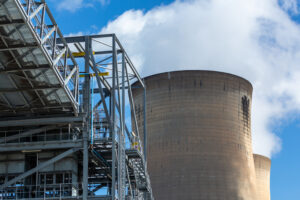What is electricity trading?
Electricity trading is the process of power generators selling the electricity they generate to power suppliers, who can then sell this electricity on to consumers. The system operator – National Grid ESO in Great Britain – oversees the flow of electricity around the country, and ensures the amounts traded will ultimately meet demand and do not overwhelm the power system.
Who is involved in electricity trading?
There are three main parties in a power market: generators (thermal power plants and energy storage sites, sources such as wind turbines and solar panels producing electricity), consumers (hospitals, transport, homes and factories using electricity), and suppliers in the middle from whom you purchase electricity.
Electricity is generated at power stations, then bought by suppliers, who then sell it on to meet the needs of the consumers.
Electricity trading refers to the transaction between power generators, who produce electricity, and power suppliers, who sell it on to consumers.
How are electricity contracts made?
Electricity trading occurs in both long- and short-term time frames, ranging from years in advance to deals covering the same day. Generation and supply must meet exact demand for every minute of the day, which means that traders must always be ready to buy or sell power to fill any sudden gaps that arise.
When trading electricity far in advance, factors such as exchange rates, the cost and availability of fuel, changing regulations and policies all affect the price. Short-term price is more volatile, and factors such as weather, news events and even what’s on television having the biggest impact on price.
Traders analyse live generation data and news reports, to predict ahead of time how much electricity will be needed during periods of high demand and then determine a price. Traders then make offers and bids to suppliers and strike a deal – these deals then dictate how and when a power station’s generators are run every day.

Why is electricity trading important?
Running a power station is an expensive process and demand for electricity never stops. The electricity market ensures the country’s power demands are met, while also aiming to keep electricity businesses sustainable, through balancing the price of buying raw materials with the price at which electricity is sold.
To ensure the grid remains balanced and meets demand, the systems operator also makes deals with generators for ancillary services, either far in advance, or last-minute. This ensures elements such as frequency, voltage and reserve power are kept stable across the country and that the grid remains safe and efficient.
Electricity trading ensures there is always a supply of power and that the market for electricity operates in a stable way
Electricity trading fast facts
- The history of modern electricity trading can be traced back to Chile in 1980, when the country privatised its power industry. This led to traders jostling to supply consumers with energy. The UK was the first European nation to take up this model, in 1990
- Electricity prices in the UK have actually occasionally gone negative. This happens when demand is low but weather conditions such as high winds or prolonged sunshine lead to an abundance of power (i.e. through wind and solar generation) This can lead to consumers being paid to use electricity – up to 4p per unit used – or to generators being paid to turn their output down or even switch off.
Go deeper
- How the market decides where Great Britain gets its electricity from
- How to: calculate gas and electricity prices
- The night shift: how a power station keeps the lights on when all the lights are off
- What is it that makes a country’s electricity system stable?
- In energy storage timing is everything
- Electricity trading agreements, explained
- Could Great Britain go off grid?
- Take a closer look at the supply, demand, price and environmental impact of Britain’s electricity in Electric Insights.






















